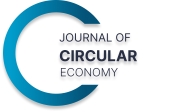Entrepreneurship in International Context: Trends and Coping With Eco-Entropy
Abstract
The rupture of the international system by the Ukranian war provides ecopreneurial opportunities for circular economies given gaps in national sovereignties laid bare by protectionism. The entropy of a full range of human needs from jobs to housing, etc. can be countered with sustainable, ‘green-green’ start-up designs stimulated by state policies yielding chances for ‘individual sovereignty’ and positive future perspectives.
DOI: https://doi.org/10.55845/HIYW8918
References
Economist (Nov. 26, 2002). The Road to Co-operation. 49-50.
Isaak, R. (2000). Managing World Economic Change.(3rd ed.). Prentice-Hall, 160.
Isaak, R. (Spring, 2003). The making of the ecopreneur, in Greener Management International. Sheffield, U.K.
Isaak, R. (1998). Green Logic: Ecopreneurship, Theory and Ethics. Sheffield, U.K.
Schaper, M.,ed. (2010). Making Ecopreneurs: Developing Sustainable Entrepreneurship. 2nd ed. Gower.
Tan, Y. (2011). Chinnovation. Wiley.
How to Cite This Article
Isaak, R. (2023). Entrepreneurship in International Context: Trends and Coping With Eco-Entropy. Journal of Circular Economy, 1(1). https://doi.org/10.55845/HIYW8918
Copyright
Open Access: This article is licensed under a Creative Commons Attribution 4.0 International License, which permits use, sharing, adaptation, distribution and reproduction in any medium or format, as long as you give appropriate credit to the original author(s) and the source, provide a link to the Creative Commons licence, and indicate if changes were made. The images or other third-party material in this article are included in the article’s Creative Commons licence, unless indicated otherwise in a credit line to the material. If material is not included in the article’s Creative Commons licence and your intended use is not permitted by statutory regulation or exceeds the permitted use, you will need to obtain permission directly from the copyright holder. To view a copy of this licence, visit http://creativecommons.org/licenses/by/4.0/.
License
Under a Creative Commons license
Author Notes
- Robert Isaak [1]
- [1] IFM Institute for SME Research & Entrepreneurship, University of Mannheim, L9,1-2, 68161 Mannheim, Germany, [email protected]
Published Details: Received 7 December 2022, Accepted 15 February 2023, available online 20 March 2023
